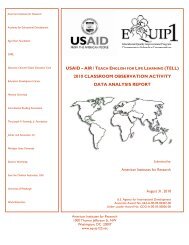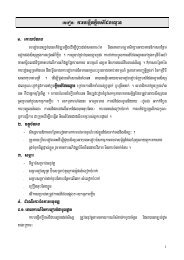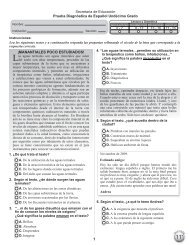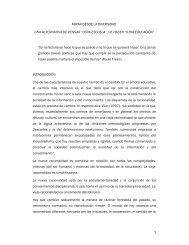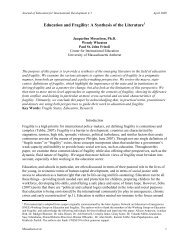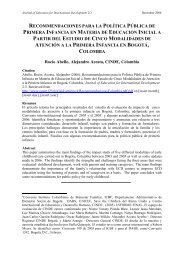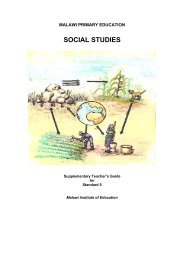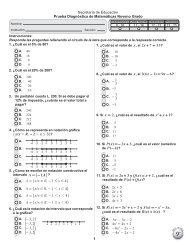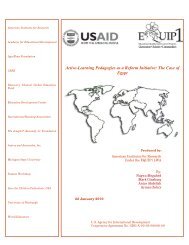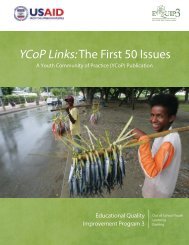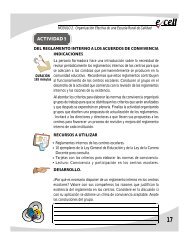The Power of Persistence: Education System ... - EQUIP123.net
The Power of Persistence: Education System ... - EQUIP123.net
The Power of Persistence: Education System ... - EQUIP123.net
You also want an ePaper? Increase the reach of your titles
YUMPU automatically turns print PDFs into web optimized ePapers that Google loves.
sector limited the agenda-setting mandate <strong>of</strong> the MOE. <strong>The</strong> more recent development<br />
<strong>of</strong> MOE capacity and SWAp structures have increased the power and<br />
mandate <strong>of</strong> the MOE within the GRZ system (e.g. MOE’s ability to argue for<br />
budget lines and priorities with the Cabinet and the Ministry <strong>of</strong> Finance) and<br />
the confidence <strong>of</strong> donor partners to program resources through MOE system<br />
and align activities with MOE investment plans.<br />
In Egypt, domestic political issues and concerns about radical Islamists<br />
effectively stalled progress in implementing decentralization and community<br />
participation throughout the 1990s. <strong>The</strong> opening for new initiatives came<br />
with the signing <strong>of</strong> a truce and the decision to open elections to other political<br />
parties, which motivated the National Democratic Party and the government<br />
to engage local communities in education and other sectors. Increasing<br />
domestic unhappiness with education quality and outcomes intensified<br />
the pressure for reform to provide Egyptian families and youth with better<br />
educational opportunities.<br />
6. Effective use <strong>of</strong> information, through evaluation, assessment, and EMIS<br />
systems, can be a powerful enabler <strong>of</strong> change.<br />
Development <strong>of</strong> greatly improved management information systems has<br />
been a hallmark <strong>of</strong> this period. In all countries studied, EMIS data is available<br />
and utilized for decision-making. <strong>The</strong> information environment in Zambia,<br />
Namibia, Nicaragua, and El Salvador is relatively robust, and Egypt has placed<br />
considerable emphasis on addressing this issue in recent years. Information<br />
for decision making is available not only through the administrative data, but<br />
also from complementary sources such as the school self-assessment system<br />
in Egypt and Namibia, the National <strong>Education</strong> Accounts in El Salvador, and<br />
various national and international student assessment systems.<br />
As well as facilitating a broader enabling political environment, information<br />
and evaluation can influence immediate policy decisions. Some examples<br />
useful in understanding the wide-ranging impact <strong>of</strong> information are found in<br />
El Salvador’s experience: World Bank evaluations and approval <strong>of</strong> EDUCO<br />
had an important impact on the credibility and perception <strong>of</strong> the MOE,<br />
and reinforced national political support for the reforms. More recently,<br />
information from El Salvador’s National <strong>Education</strong> Accounts highlighted<br />
the harmful effect <strong>of</strong> disproportionate parental financial contribution at the<br />
secondary level, resulting in a major policy change that eliminated school fees<br />
at that level. In fact, information and empirical assessment has been central to<br />
the MINED process <strong>of</strong> consultations, participatory assessment, transparency<br />
about progress, and goal setting.<br />
142<br />
SECTION 3: SUMMARY fINdINGS ANd CONClUSIONS



